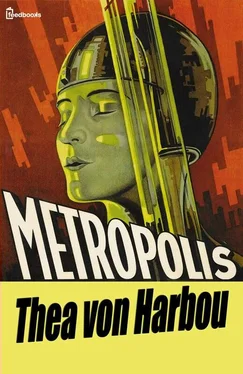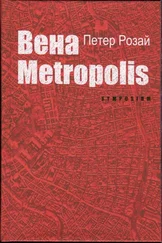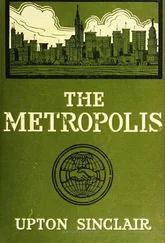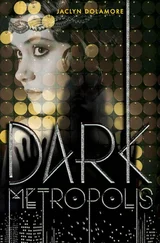Could it be possible that this man, who knew everything, knew nothing of her?
Nothing about him betrayed that he was aware of the upheavel in the well-being and disposition of his young master, since that day in the "Club of the Sons." But it was one of the slim, silent one's greatest secrets never to give himself away, and, although he had no entrance to the "Club of the Sons" Freder was by no means sure that the money-backed agent of his father would be turned back by the rules of the club.
He felt himself exposed, unclothed. A cruel brightness, which left nothing concealed, bathed him and everything in his workshop which was almost the most highly situated room in Metropolis.
"I wish to be quite alone," he said softly.
Silently the servants vanished, Slim went… But all these doors, which closed without the least sound, could also, without the least sound, be opened again to the narrowest chink.
His eyes aching, Freder fingered all the doors of his work-room.
A smile, a rather bitter smile, drew down the corners of his mouth. He was a treasure which must be guarded as crown jewels are guarded. The son of a great father, and the only son.
Really the only one—?
Really the only one—?
His thoughts stopped again at the exit of the circuit and the vision was there again and the scene and the event…
The "Club of the Sons" was, perhaps, one of the most beautiful buildings of Metropolis, and that was not so very remarkable. For fathers, for whom every revolution of a machine-wheel spelt gold, had presented this house to their sons. It was more a district than a house. It embraced theatres, picture-palaces, lecture-rooms and a library — In which, every book, printed in all the five continents, was to be found-race tracks and stadium and the famous "Eternal Gardens."
It contained very extensive dwellings for the young sons of indulgent fathers and it contained the dwellings of faultless male servants and handsome, well-trained female servants for whose training more time was requisite than for the development of new species of orchids.
Their chief task consisted in nothing but, at all times, to appear delightful and to be incapriciously cheerful; and, with their bewildering costume, their painted faces, and their eye-masks, surmounted by snow-white wigs and fragrant as flowers, they resembled delicate dolls of porcelain and brocade, devised by a master-hand, not purchaseable but rather delightful presents.
Freder was but a rare visitant to the "Club of the Sons." He preferred his work-shop and the starry chapel in which this organ stood. But when once the desire took him to fling himself into the radiant joyousness of the stadium competitions he was the most radiant and joyous of all, playing on from victory to victory with the laugh of a young god.
On that day too… on that day too.
Still tingling from the icy coolness of falling water, every muscle still quivering in the intoxication of victory he had lain, stretched out, slender, panting, smiling, drunken, beside himself, almost insane with joy. The milk-coloured glass ceiling above the Eternal Gardens was an opal in the light which bathed it. Loving little women attended him, waiting roguishly and jealously, from whose white hands, from whose fine finger-tips he would eat the fruits he desired.
One was standing aside, mixing him a drink. From hip to knee billowed sparkling brocade. Slender, bare legs held proudly together, she stood, like ivory, in purple, peaked shoes. Her gleaming body rose, delicately, from her hips and — she was not aware of it — quivered in the same rhythm as did the man's chest in exhaling his sweet-rising breath. Carefully did the little painted face under the eye-mask watch the work of her careful hands.
Her mouth was not rouged, but yet was pomegranate red. And she smiled so unselfconsciously down at the beverage that it caused the other girls to laugh aloud.
Infected, Freder also began to laugh. But the glee of the maidens swelled to a storm as she who was mixing the drink, not knowing why they were laughing, became suffused with a blush of confusion, from her pomegranate-hued mouth to her lustrous hips. The laughter induced the friends, for no reason, only because they were young and care-free, to join in the cheerful sound. Like a joyously ringing rainbow, peal upon peal of laughter arched itself gaily above the young people.
Then suddenly — suddenly — Freder turned his head. His hands, which were resting on the hips of the drink-mixer, lost hold of her, dropping down by his sides as if dead. The laughter ceased, not one of the friends moved. Not one of the little, brocaded, bare — limbed women moved hand or foot. They stood and looked.
The door of the Eternal Gardens had opened and through the door came a procession of children. They were all holding hands. They had dwarves' faces, grey and ancient. They were little ghost — like skeletons, covered with faded rags and smocks. They had colourless hair and colourless eyes. They walked on emaciated bare feet. Noiselessly they followed their leader.
Their leader was a girl. The austere countenance of the Virgin. The sweet countenance of the mother. She held a skinny child by each hand. Now she stood still, regarding the young men and women one after another, with the deadly severity of purity. She was quite maid and mistress, inviolability — and was, too, graciousness itself, her beautiful brow in the diadem of goodness; her voice, pity; every word a song.
She released the children and stretched forward her hand, motioning towards the friends and saying to the children:
"Look, these are your brothers!"
And, motioning towards the children, she said to the friends:
"Look, these are your brothers!"
She waited. She stood still and her gaze rested upon Freder.
Then the servants came, the door-keepers came. Between these walls of marble and glass, under the opal dome of the Eternal Gardens, there reigned, for a short time, an unprecedented confusion of noise, indignation and embarrassment. The girl appeared still to be waiting. Nobody dared to touch her, though she stood so defenceless, among the grey infant-phantoms, Her eyes rested perpetually on Freder.
Then she took her eyes from his and, stooping a little, took the children's hands again, turned and led the procession out. The door swung to behind her; the servants disappeared with many apologies for not having been able to prevent the occurrence. All was emptiness and silence. Had not each of those before whom the girl had appeared, with her grey procession of children, so large a number of witnesses to the event they would have been inclined to put it down to hallucination.
Near Freder, upon the illuminated mosaic floor, cowered the little drink-mixer, sobbing uncontrolledly.
With a leisurely movement, Freder bent towards her and suddenly twitched the mask, the narrow black mask, from her eyes.
The drink-mixer shrieked out as though overtaken in stark nudity. Her hands flew up, clutching, and remained hanging stiffly in the air.
A little painted face stared, horror-stricken at the man. The eyes, thus exposed, were senseless, quite empty. The little face from which the charm of the mask had been taken away, was quite weird.
Freder dropped the black piece of stuff. The drink-mixer pounced quickly upon it, hiding her face. Freder looked around him.
The Eternal Gardens scintillated. The beautiful beings in it, even if, temporarily, thrown out of balance, shone in their well-cared-for-ness, their cleanly abundance. The odour of freshness, which pervaded everywhere, was like the breath of a dewy garden.
Freder looked down at himself. He wore, as all the youths in the "House of the Sons," the white silk, which they wore but once — the soft, supple shoes, with the noiseless soles.
Читать дальше












